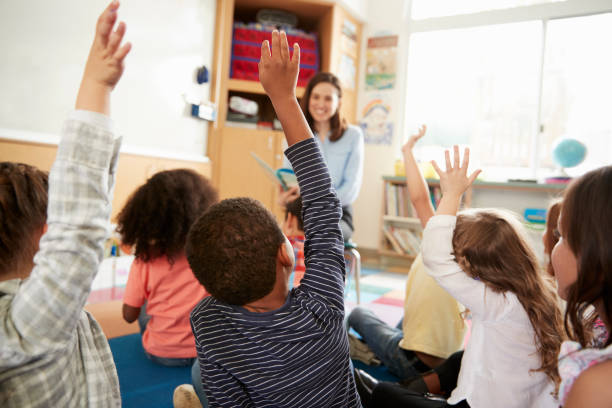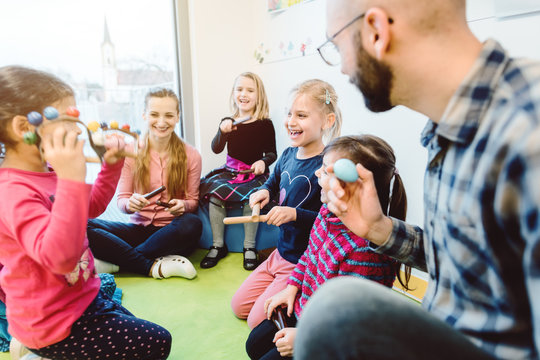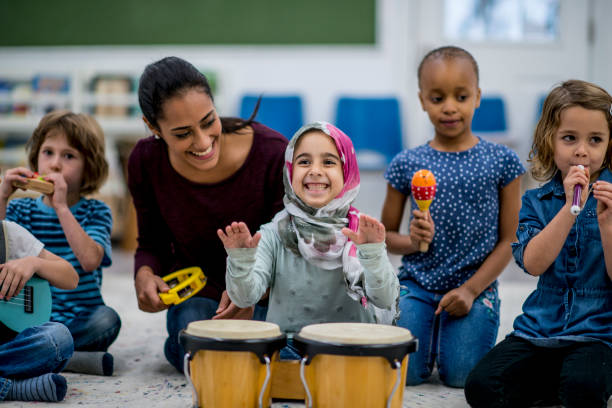Music Matters
How Music Education Helps Students Learn, Achieve and Succeed
Music education has powerful and undeniable effects on student learning, achievement and lifelong success. Music represents the complexity and meaning of a culture, society and history. Learning music is a discipline that compels one to have a depth of understanding and offers an opportunity for advanced skill development. Building on the first release of Music Matters in 2011, the Arts Education Partnership has reviewed multiple research studies identified within ArtsEdSearch — the national clearinghouse of rigorous arts education research — to explore the importance of music on student learning outcomes. Here are the bullet points of 19 peer reviewed studies, which are referenced at the bottom.
The body of evidence that identifies music’s positive impact on student success continues to grow and support the findings that music education:
1. Equips students with foundational skills to learn.
2. Bolsters student engagement and achievement in other academic subjects.
3. Develops the abilities essential for lifelong success.
*Music education equips students with foundational skills to learn.
Music education helps students develop motor skills and cognitive capacities, providing the tools needed for learning and content mastery. It also facilitates recall, retention, verbal sequencing and problem-solving in the following ways:
 1. Enhances fine motor skills. Motor function is the ability to use muscle movements to write, use a computer and perform other physical activities essential for learning. Music instruction helps develop the parts of the brain associated with sensory and motor function; and research demonstrates that instrumentally, musically trained children have better fine motor function than non-musically trained children.
1. Enhances fine motor skills. Motor function is the ability to use muscle movements to write, use a computer and perform other physical activities essential for learning. Music instruction helps develop the parts of the brain associated with sensory and motor function; and research demonstrates that instrumentally, musically trained children have better fine motor function than non-musically trained children.
2. Prepares the brain for achievement. Research shows ninth-grade musicians score significantly higher on algebra assessments than their non-music counterparts, as their brains are accustomed to performing the underlying processes used in complex math. Further, high school band students have, on average, higher achievement scores in English, math and biology.
3. Fosters superior working memory and vocabulary. Working memory is the ability to mentally retain, control, sequence and manipulate information to complete higher-order tasks, such as reasoning and problem-solving. Research demonstrates that primary school children with three or more years of exposure to piano outperform those without exposure on vocabulary and verbal sequencing tasks. Research shows that musicians have advanced working memory and vocabulary development, and can selectively focus and recall tasks better than their non-musician peers.
4. Cultivates critical thinking skills. Thinking skills, such as abstract reasoning, are integral to students’ abilities to apply knowledge and visualize solutions. Studies show that young children who take keyboard lessons possess greater abstract reasoning abilities than their peers, and that these abilities improve over time with sustained music training.
Students who study music not only develop musical abilities, but also receive benefits that extend to other academic areas, such as science and math. Research demonstrates that music and other arts integration practices positively affect student learning across subjects and overall scholastic success in the following ways:
 1. Facilitates learning of other subjects. Integrating arts or music lessons into other academic subjects, such as science and history, continues to hold impressive effects on engagement, excitement and content recollection of that subject. To illustrate, students in a science class who were asked to translate what was being learned about one content (science) into another mode (musical lyrics) showed significant content retention and a positive attitude toward the science material.
1. Facilitates learning of other subjects. Integrating arts or music lessons into other academic subjects, such as science and history, continues to hold impressive effects on engagement, excitement and content recollection of that subject. To illustrate, students in a science class who were asked to translate what was being learned about one content (science) into another mode (musical lyrics) showed significant content retention and a positive attitude toward the science material.
2. Advances math achievement. Students who study music outperform their non-music peers in assessments of math, and that increases over time. These findings hold true regardless of socio-economic status and race/ethnicity. Additionally, students involved in instrumental music perform better in algebra, a course found to be critical in later academic achievement.
3. Boosts proficiency in reading, English language arts and second languages. Students who study music surpass non-music students in assessments of writing, using information resources, demonstrating competency and fluency in reading, responding and proofreading. Furthermore, musicians also exhibit increased second-language performance compared with non-musicians. The gains in achievement of music students compared with non-music students increase over time.
4. Impacts positive engagement in school. High school dropout is a significant problem in American public education, and music can be a promising solution to increase student engagement. The associated costs of high school dropout are highest among low-income and minority students. Research suggests that at-risk students enrolled in music and arts courses find school more engaging and are more likely to pursue higher education.
Persistence, attention and creativity are components of higher-level thinking and complex problem-solving. Music also has the power to connect students to cultural and social values. Music education nurtures these executive functioning skills that are essential for success in today’s global economy in the following ways:
 1. Sharpens attentiveness. The abilities to pay attention and stay engaged — planning, focus, active listening and staying on task — are important to school performance and success in the workforce. Attentiveness begins to develop early in life and is continuously refined into adulthood. Early childhood exposure to music lessons improves these attention skills, while continued music education throughout adolescence reinforces and strengthens them.
1. Sharpens attentiveness. The abilities to pay attention and stay engaged — planning, focus, active listening and staying on task — are important to school performance and success in the workforce. Attentiveness begins to develop early in life and is continuously refined into adulthood. Early childhood exposure to music lessons improves these attention skills, while continued music education throughout adolescence reinforces and strengthens them.
2. Strengthens perseverance. Perseverance is the ability to continue toward a goal when presented with obstacles. Students involved in music lessons surpass their peers on tasks measuring perseverance. At the foundation of perseverance are motivation, leadership and persistence, all of which can have positive effects on student learning and future success.
3. Equips students to be creative. Music education helps develop originality and flexibility, which are key components of creativity and innovation. Research shows that students participating in music and arts-based activities, such as music improvisation, employ creative thinking. These findings suggest music improvisation fosters leadership qualities, such as navigating and managing problems, confronting challenges and developing interpersonal competencies.
4. Supports self-esteem and social and cultural identities. Emerging research demonstrates that students are better able to connect with their own cultural heritage through a wide array of culturally responsive music and improvisational opportunities. As classrooms across the country continue to become increasingly diverse, students could better connect with their own cultural identity through participation in music.
Music Matters
Research continues to illustrate the demonstrated effects of music education on student achievement. Early and sustained educational experiences in music deliver skills that can be effective predictors of long-term success in college, careers and citizenship. By investing in music instruction across the P-20 spectrum, education leaders, policymakers and practitioners can continue to provide students with the tools they need to learn, achieve in other academic subjects and develop the foundational capacities for lifelong success.
References:
1. Marie Forgeard et al., “Practicing a Musical Instrument in Childhood is Associated with Enhanced Verbal Ability and Nonverbal Reasoning,” PLOS ONE: (2008); and Krista Hyde et al., “Musical Training Shapes Structural Brain Development,” Journal of Neuroscience 29, no. 10 (March 2009): 3019-3025.2. Barbara Helmrich, “Window of Opportunity? Adolescence, Music, and Algebra,” Journal of Adolescent Research 25, no. 4 (April 2010): 557-577.
3. Peter Gouzouasis, Martin Guhn, and Nand Kishor, “The predictive relationship between achievement and participation in music and achievement in core Grade 12 academic subjects,” Music Education Research 9, no. 1 (2007): 81-92.
4. Joseph Piro and Camilo Ortiz, “The effect of piano lessons on the vocabulary and verbal sequencing skills of primary grade students,” Psychology of Music 37, no. 3 (March 2009).
5. Laura-Ann Petitto, “Arts Education, the Brain, and Language,” in Learning, Arts, and the Brain, eds. Carolyn Asbury and Barbara Rich (New York: The Dana Foundation, 2008).
6. James S. Catterall and Frances H. Rauscher, “Unpacking the Impact of Music on Intelligence,” in Neurosciences in Music Pedagogy, eds. Wilfried Gruhn and Francis Rauscher (Hauppauge, NY: Nova Science Publishers, Inc., 2008), 171-201; and Adrian Hille and J ürgen Schupp, How learning a musical instrument affects the development of skills (Berlin: German Institute for Economic Research, 2013).
7. Ronald Richardson and Liane Brouillette, “Historic and Ethnic Music Found to Increase Geographic Understanding: A Quasi-Experimental Study,” Journal for Learning through the Arts 9, no. 1 (2013).
8. Sara Nelson and Lori Norton-Meier, “Singing in Science. Writing and Recording Student Lyrics to Express Learning,” Journal for Learning through the Arts 5, no. 1 (2009).
9. Catterall and Rauscher, “Unpacking the Impact,” 171-201.
10. Helmrich, “Window of Opportunity,” 557-577; and Susan Joan Courey et al., “Academic Music: Music Instruction to Engage ThirdGrade Students in Learning Basic Fraction Concepts,” Educational Studies in Mathematics 81, no. 2 (October 2012): 251-278.
11. Petitto, “Arts Education,” 93-104.
12. Catterall and Rauscher, “Unpacking the Impact,” 171- 201; and Petitto, “Arts Education,” 93-104.
13. Kenneth Elpus, Arts Education and Positive Youth Development: Cognitive, Behavioral, and Social Outcomes of Adolescents who Study the Arts (Washington, DC: National Endowment for the Arts, 2013).
14. Becky J. A. Eason and Christopher M. Johnson, Prelude: Music Makes Us Baseline Research Report (Nashville: Metro Nashville Public Schools, 2013).
15. Franziska Degé, Claudia Kubicek, and Gudrun Schwarzer, “Music Lessons and Intelligence: A Relation Mediated by Executive Functions,” Music Perception: An Interdisciplinary Journal 29, no. 2 (December 2011), 195-201.
16. Debra Ingram and Judy Meath, Arts for Academic Achievement: A Compilation of Evaluation Findings from 2004-2006 (Minneapolis: University of Minnesota Center for Applied Research and Educational Improvement, March 2007); and Eason and Johnson, Prelude.
17. Jen Katz-Buonincontro, “Does Arts-Based Learning Enhance Leadership? Case Studies of Creativity-Oriented Executive Institutes,” (paper presented at American Educational Research Association annual meeting, April 14, 2005); and Theano Koutsoupidou and David Hargreaves, “An experimental study of the effects of improvisation on the development of children’s creative thinking in music,” Psychology of Music 37, no. 3 (March 2009): 251.
18. Julia T. Shaw, “‘The Music I Was Meant to Sing’: Adolescent Choral Students’ Perceptions of Culturally Responsive Pedagogy,” Journal of Research in Music Education 64, no. 1 (February 2016).
19. Eason and Johnson, Prelude.

